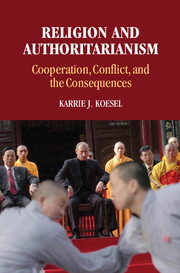Book contents
- Frontmatter
- Dedication
- Contents
- List of Figure, Table, and Illustrations
- Acknowledgments
- 1 Introduction: The Politics of Religion
- 2 Religion and State Games
- 3 Regulating the Religious Marketplace
- 4 The Political Economy of Religious Revival
- 5 The Politics of Faith, Power, and Prestige
- 6 Conclusions: Collaboration and Conflict in Comparison
- Appendix A Methodology and Data
- Appendix B Interviews Cited
- Bibliography
- Index
- References
6 - Conclusions: Collaboration and Conflict in Comparison
Published online by Cambridge University Press: 05 June 2014
- Frontmatter
- Dedication
- Contents
- List of Figure, Table, and Illustrations
- Acknowledgments
- 1 Introduction: The Politics of Religion
- 2 Religion and State Games
- 3 Regulating the Religious Marketplace
- 4 The Political Economy of Religious Revival
- 5 The Politics of Faith, Power, and Prestige
- 6 Conclusions: Collaboration and Conflict in Comparison
- Appendix A Methodology and Data
- Appendix B Interviews Cited
- Bibliography
- Index
- References
Summary
The devil is in the details.
Karl Marx declared religion the “opium of the people,” and for decades communist leaders waged a war on religion: churches, mosques, and temples were destroyed; religious leaders were executed; scientific atheism was taught in schools; and ubiquitous propaganda denounced religion as feudal, superstitious, and backward. But in the end, as the Soviet Union collapsed and post-Mao China embraced capitalism, it was clear that another aspect of the great socialist experiment had failed – religion did not die out as Marxist-Leninist and Maoist ideology had predicted. In fact, as Russia and China distanced themselves from their communist pasts, it became increasingly apparent that religious associational life was flourishing.
This book set out to enhance our understanding of the politics of religion in authoritarian regimes by answering a number of questions. Among them, what is the relationship between religious and political authority? Do religious groups function as a constraint on or partner to authoritarian regime leaders? When do religious groups, as members of civil society, encourage political liberalization, and when do they reinforce autocratic traditions of rule? How do different authoritarian contexts affect the development of religious associational life and the prospects of cooperation or conflict with those in power?
- Type
- Chapter
- Information
- Religion and AuthoritarianismCooperation, Conflict, and the Consequences, pp. 157 - 184Publisher: Cambridge University PressPrint publication year: 2014



